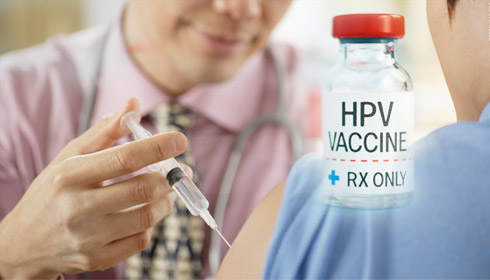
Canada mulls shifting to 1-dose gender-neutral HPV Vaccination in a bid to eliminate cervical cancer
The Canadian Medical Association Journal (CMAJ) published new modelling suggesting that Canada's immunisation programs could soon shift to a one-dose, gender-neutral human papillomavirus (HPV) vaccination method, potentially eliminating cervical cancer. This strategy is consistent with WHO recommendations and has important implications for public health in Canada and other high-income nations.
Researchers from Ontario and Quebec simulated several 1- and 2-dose HPV vaccination techniques to help inform national immunisation guidelines. Their findings indicate that a single-dose technique may give comparable protection against HPV-related cervical cancer to a two-dose approach. Dr. Marc Brisson, a professor at Laval University and director of the Mathematical Modelling and Health Economics of Infectious Diseases Lab, stated, "Our findings have significant policy implications in Canada and other similar high-income countries considering switching to 1-dose HPV vaccination."
The transition to a one-dose HPV vaccination program is consistent with the WHO Strategic Advisory Group of Experts on Immunisation's 2022 recommendation, which is based on clinical trials that demonstrated significant protection with a single dose. Human papillomavirus, which causes cervical cancer and other disorders, remains a major worldwide health concern, especially in areas with low vaccine coverage.
The Canadian researchers' modeling revealed that a 1-dose vaccination, particularly in a gender-neutral formulation, could prevent approximately the same amount of cervical cancer as a 2-dose strategy if protection is maintained during peak sexual activity ages. The report projected all 1-dose vaccination scenarios, even the most pessimistic ones, to be substantially more efficient in using vaccine doses than 2-dose vaccination, and to lead to the elimination of cervical cancer in Canada between 2032 and 2040.
Dr. Chantal Sauvageau, a community health specialist and infectious disease consultant at Quebec's National Institute of Public Health, highlighted the shift's economic and programmatic benefits. "The potential economic savings from switching to 1-dose vaccination and its programmatic flexibility could allow investments to increase vaccination uptake in regions with suboptimal coverage and high HPV burden subgroups," she told me. This adjustment could help reduce the pandemic's impact on HPV vaccination programs, which were disrupted, particularly among vulnerable groups.
The researchers investigated numerous scenarios using the HPV-ADVISE model, which is a comprehensive simulation of HPV transmission and illness outcomes. In Quebec, where HPV vaccination rates are high (about 85%), and Ontario, where rates are lower (approximately 65%), the model predicted that 1-dose vaccination might still eliminate cervical cancer, even in gloomy scenarios where vaccine efficacy declines after 25 years.
The study finds that if a single dose provides protection for more than 25 years, a one-shot vaccination technique could be highly effective. The study's authors advise regular monitoring of 1-dose protection to detect signs of waning protection. The cost and logistical benefits of the 1-dose strategy make it an appealing option for increasing vaccine coverage in underprivileged areas and eliminating disparities worsened by the COVID-19 pandemic.
With the transition to this gender-neutral, single-dose method, Canada may be on track to become one of the first countries to eradicate cervical cancer. If successful, other high-income countries might adopt the strategy, leading to a global decrease in HPV-related malignancies.